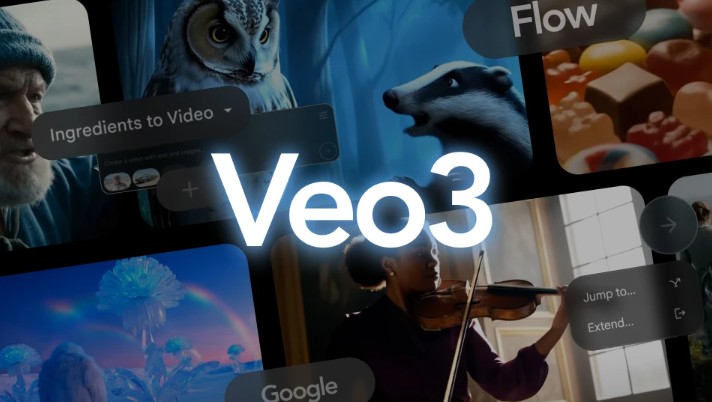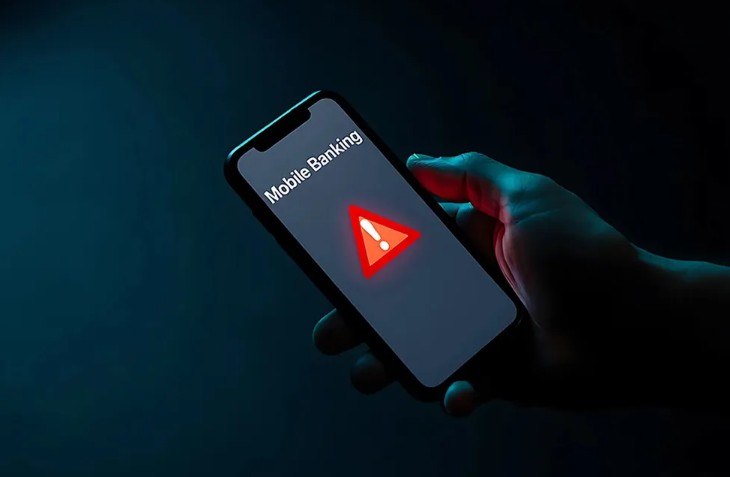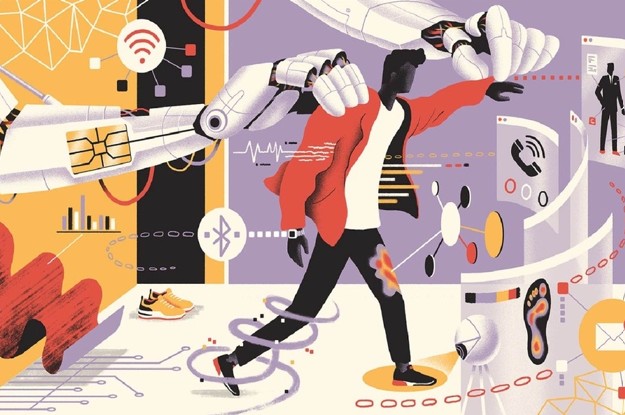Best Selling Products
Generation Z Faces Risk of Being "Overtaken" by AI
Nội dung
- 1. Opportunities are shrinking: Entry-level jobs are becoming scarce.
- 2. Why is Gen Z being “knocked out” of entry-level positions?
- 3. Job dreams and harsh reality
- 4. Being replaced by AI or being “left out”?
- 5. What does Gen Z say about AI replacement?
- 6. There are still opportunities if Gen Z knows how to adapt
- 7. Advantages of Gen Z in the AI era
- 8. So what should Gen Z do?
- 8.1. Take the initiative to learn basic AI skills
- 8.2. Soft skills development – something AI can’t do well
- 8.3. Accept constant change and learn to adapt quickly
- 8.4. Focus on human differences
Gen Z – the generation considered to be technologically agile – is caught in a volatile race for survival. So what is happening?

In an era where artificial intelligence (AI) is becoming an indispensable part of many fields, young people, especially Gen Z, are facing a challenging question: can AI replace them? The story is no longer a distant future vision but has been and is present in every recruitment, every entry-level job that is considered a "launching pad" for those who have just graduated. In that context, Gen Z - the generation that is considered to be quick on technology is falling into a volatile race for survival. So what is happening? Let's find out through the article below with SaDesign!
1. Opportunities are shrinking: Entry-level jobs are becoming scarce.
While companies used to reserve a large number of entry-level positions to nurture young talent, this door is now closing. A report from SignalFire, a company that analyzes job market data, shows that the number of entry-level positions at large technology corporations has decreased by more than 50% compared to before the Covid-19 pandemic. For startups, this figure is more than 30%.
Not only that, the rate of graduates from top computer science programs who have the opportunity to work at large technology companies has also halved in just 2 years (2022-2024). This is a big shock for young people who once had high expectations for their future in the technology industry.
.png)
Even the Federal Reserve Bank of New York (NY Fed) recorded a worrying number: the unemployment rate for computer science majors is 6.1%, higher than the overall unemployment rate for new graduates (5.8%).
2. Why is Gen Z being “knocked out” of entry-level positions?
It’s not that Gen Z is weak or lacking in effort. On the contrary, they are better equipped with technological knowledge than any previous generation. The problem lies in the rise of AI, a “virtual employee” who can work tirelessly, without requiring a salary, and most importantly, without training.
According to Professor Daniela Rus – Director of the Computer Science and Artificial Intelligence Laboratory at MIT:
“Elementary positions typically consist of well-defined tasks – the kind of work that is ideal for AI to automate.”
This was further confirmed by Keri Mesropov, founder of Spring Talent Development:
“AI is rapidly reshaping entry-level jobs, automating repetitive tasks, streamlining workflows, and even eliminating some positions entirely.”
That is, jobs that were originally meant for beginners such as data entry, simple quality control, report compilation, and basic customer care are gradually being “robbed” by AI.
3. Job dreams and harsh reality
.png)
Not only are opportunities dwindling, but the gap between expectations and reality is becoming more apparent. ZipRecruiter’s latest 2025 survey of 3,000 college students found:
Nearly 40% of seniors believe that an internship will help them get a job right away.
But in reality, only 9% of graduates achieve this.
Students expect an average salary of $101,500 a year, but only receive about $68,400 a year.
Not only disappointed about opportunities, Gen Z is also shocked by salaries that are much lower than imagined, while the cost of living, studying, and technology is increasing day by day.
“The gap between expectations and reality is huge,” says Sam DeMase, career expert at ZipRecruiter.
4. Being replaced by AI or being “left out”?
The sad truth is that many young people are unemployed even though they have good degrees and decent skills. According to the survey:
More than 50% of tech job seekers aged 25–34 did not receive any job offers in the past month.
For 18–24 year olds, the figure is closer to 44%.
Even another survey by Hult International Business School showed:
37% of HR leaders prioritize using AI over hiring new graduates.
This shows that AI is not just supporting jobs anymore, but is actually replacing the young workforce, especially in jobs that are repetitive and easy to measure.
.png)
5. What does Gen Z say about AI replacement?
Panic and anxiety are widespread. A 26-year-old software engineer working at Amazon told Business Insider:
“Before, it took me a day to do a task, now AI helps me do it in an hour. But the work is not reduced – on the contrary, I have to do more. I don’t know if there will come a time when AI will do everything I am doing and replace me completely.”
Many young people feel both grateful and fearful about using AI. It helps them increase productivity, but also makes them lose their sense of job security.
6. There are still opportunities if Gen Z knows how to adapt
However, not all doors are closed. AI is not an “arch-enemy”. In fact, experts assert that opportunities still exist, if Gen Z changes its mindset and approach.
Josh Bersin, CEO of The Josh Bersin Company, said:
“Elementary jobs are not being eliminated, but are being transformed. The AI revolution is also creating many new jobs such as systems development, data management, and AI platform training.”
In particular, positions requiring creativity, critical thinking, ethics, team management, etc. are skills that AI cannot replace in the short term.
.png)
7. Advantages of Gen Z in the AI era
In that somewhat bleak picture, there is one bright spot worth hoping for: Gen Z is tech-savvy.
Professor Melissa Valentine from Stanford Institute (HAI) commented:
“Gen Z has good knowledge and technology skills – this is a huge advantage. Companies need to figure out how to take advantage of this human resource.”
Professor Daniela Rus agrees:
“They don’t have to fight against AI. Gen Z’s flexibility and comfort with technology is a strength that will help them shape how humans use AI in a positive and ethical way.”
In other words, Gen Z should not avoid AI but rather seek to accompany and master it.
8. So what should Gen Z do?
So what should Gen Z do to "survive" and thrive in the AI era?
8.1. Take the initiative to learn basic AI skills
Understanding and mastering AI-related tools is no longer a plus but is gradually becoming a minimum requirement in many industries. Gen Z should start with basic skills such as:
Use popular automation tools like ChatGPT, Notion AI, Zapier, Canva AI, Runway…
Understand the basics of how AI models work (machine learning, training data, prompt engineering…).
Practice data analysis with tools like Excel, advanced Google Sheets, or Power BI.
Build workflows with AI to increase personal productivity, such as using AI to help write reports, filter data, or plan.
This does not require you to be a programmer, but only to know how to use AI as an “intelligent assistant”. With this skill, you will be different from the majority of people who are being “surpassed” by AI.
.png)
8.2. Soft skills development – something AI can’t do well
While AI is getting better at technical tasks, soft skills are still the preserve of humans. These are the skills that AI cannot replace in the near future, including:
Critical thinking: Knowing how to ask questions, analyze problems, not just follow orders – this is extremely necessary in a flexible working environment.
Effective communication: Knowing how to convey ideas, negotiate, and work in teams – an indispensable part of modern work.
Time management and prioritization: The ability to organize work scientifically and allocate resources reasonably will help you stand out in an age of abundant information and many support tools.
Leadership: Even if they are not yet in a management position, Gen Z should learn to lead small groups and proactively make decisions because organizations are looking for people with “leader” qualities.
These skills cannot be learned overnight, but if Gen Z practices them early, they will have a distinct advantage over candidates who are only good at their expertise.
8.3. Accept constant change and learn to adapt quickly
One of the defining characteristics of the AI era is the breakneck pace of innovation. Technology that is groundbreaking today may be obsolete tomorrow. Therefore, Gen Z needs to develop a lifelong learning mindset.
Get used to constantly updating information, learning new skills through online courses, webinars, and professional communities.
Knowing how to learn on your own is an advantage: from learning a new AI tool, to adapting to modern work software.
More importantly, Gen Z needs to overcome the mentality of "being content" and "settling down early" because in the AI world, stability means going slow.
Learning is no longer limited to school. Successful people are those who learn quickly and learn correctly, whether in work or in life.
.png)
8.4. Focus on human differences
While AI can do things like compile data, write emails, and draw digital photos, it lacks emotion, social awareness, or work ethic. This is where Gen Z can shine.
Creativity: AI can copy style, but it cannot create a breakthrough of human nature. Genuine creativity that comes from emotions and personal experiences is still the advantage of young people.
Emotions and connections: While chatbots can converse fluently, they cannot understand and respond to emotions like humans. In jobs related to customer service, human resource management, psychological counseling, or even marketing – empathy is still the key.
Ethical thinking: AI has no right/wrong ability, no legal responsibility. Gen Z – as operators – needs to learn how to make responsible, humane decisions and balance efficiency with human values.
By taking advantage of these, Gen Z not only “reserves a place” for themselves in the future, but also contributes to shaping how AI is developed and used in a civilized and ethical manner.
Can AI replace Gen Z?
The answer is: Not quite. But if they don't adapt, Gen Z will be left behind.
AI is changing the way we work, the way we recruit, and even the way we view human value in organizations. With their technological advantages and adaptability, Gen Z can absolutely become pioneers in the AI era.
The question isn’t “Who will AI replace?”, but how we collaborate and harness the power of AI as a tool, not a threat. Gen Z, if they can harness this, could not only save their jobs, but also redefine the future of work.












































